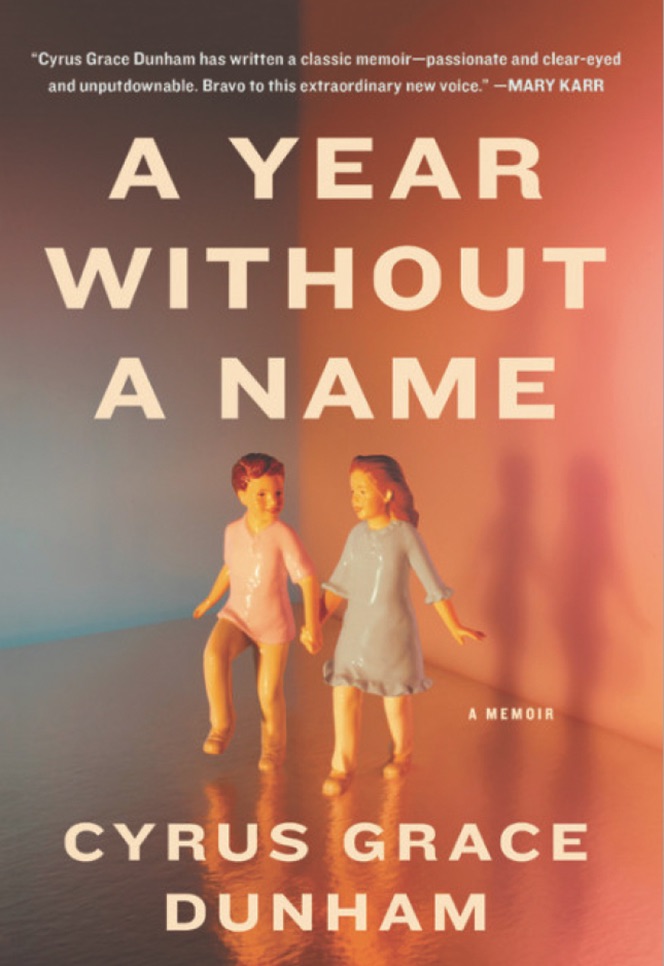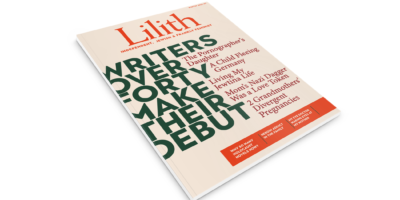
The Spectrum of Gender, and of Life
Before reading this book, I’d heard Cyrus Dunham’s famous last name and had a vague memory related to his sister Lena. But mostly I had a sense this would be good, and it was: A Year Without a Name (Little, Brown, $16.99, paperback) is a resonant memoir about making sense of gender and of life.
And life, as Dunham describes it, is lived in the liminal spaces, the—to introduce a Jewish concept in this quietly Jewish book (it even has a d’var Torah at the end!)—beyn hashmashot. Between the sources of light. The moment between day and night. Even though this is a book in some ways about gender identity, transition, confirmation, it’s also about a spectrum, the places between the extremes.
To Abigail Shrier, as Dunham notes in his preface responding to her transphobic book Irreversible Damage, the ambiguity of the gender-identity spectrum is proof of an absence, an impossibility. How can one person be in multiple places at once? Dunham’s very existence, and the complexity it instantiates, shows how very incorrect Shrier is. No person is impossible. And no person is wrong.
Dunham is aware of the privileges afforded to people who seem like the chosen ones. He’s skeptical of “The myth that as children of artists we had inherited their greatness and were carrying it forward. The myth that we deserved what we had. The myth that the lives of people who make things are more significant than everyone else’s.” And yet, he wrote this book. Because “When I was little, I thought I’d be famous when I grew up…. I had been told, again and again, that I was one of the most special of all. I had a special family and I lived in a special world. Everyone in it would, should, be remembered.” If this sounds like the lament of every almost-but-not-child prodigy who went to Harvard or Yale, that doesn’t make it wrong.
And if Dunham seems a bit young— and he does, and it’s charming—he knows. As a young child, Dunham already “knew what to say to make [grown-ups] love me. It was so easy to impress them. All I had to do was ask questions, listen closely, and ask more questions. Adults were lonely and wanted someone to talk to, even if it was a child.” How very artistic. But art, and privilege, doesn’t protect you from the hard stuff. There’s such a stirring pathos to this book. Dunham writes, again and again, about failure, about failing to be a woman, failing to be a girl, failing at gender.
He says “I catalogued my own supposed identities. Woman: I’d already failed at that. Were I to become a man one day: I’d calcify into an apathetic voyeur, so protected by privilege as to be incapable of feeling. White person: my subjectivity was irrevocably distorted by my violent inheritance. This calculus made failure feel inevitable, resistance an impossibility.” And later, “If I failed at being a girl, I’d reveal the truth: that I was inherently perverted.” For Dunham, the stakes are profound: “How could anyone else love me if I was disgusted by myself?”
This isn’t a book of easy answers, of gender confirmation solving all problems. Maybe gender non-conformity should have been okay for this special child of an artistic family whose mother talks comfortably about breast buds and puberty and whose father objects to the removal of body hair on feminist grounds. Is that, alongside an elite education and access to the world’s possibilities, the best kind of privilege? (But what about a sister who tells a 5-year-old that it’s not okay for a girl to love another girl? Especially when that sister—and here Dunham’s touch is light, and careful—becomes both “the voice of a generation” and its punching bag?) Even with all the privilege and access and art, feeling wrong is hard. Eating disorder-depression-binge drinking-anxiety-panic-attack hard. Dunham doesn’t make it simple or causal; he’s just generously welcoming us into his life.
I don’t know if Dunham is familiar with the beautiful Hebrew poem by Zelda, “Each of Us Has a Name.” The title of this memoir, A Year Without a Name, feels like a deliberate echo of this stirring anthem of identity and existence. Even in Dunham’s year without a name, even in Dunham’s year—Dunham’s lifetime—of figuring out if he could feel not-wrong, he had names. They were just hidden in the in-betweens. But the in-betweens are, for Dunham, hidden no more.
Sharrona Pearl is Associate Professor of Medical Ethics at Drexel University. Her latest book is Face/On: Face Transplants and the Ethics of the Other.






